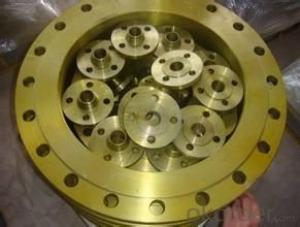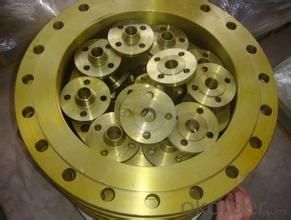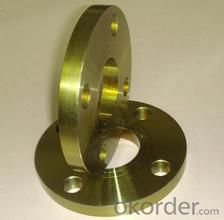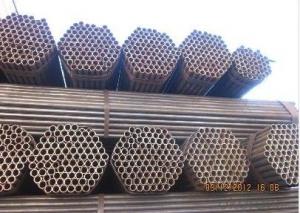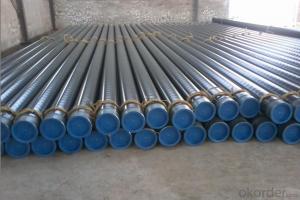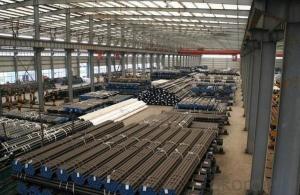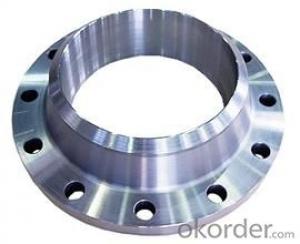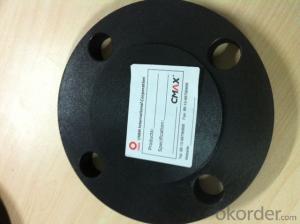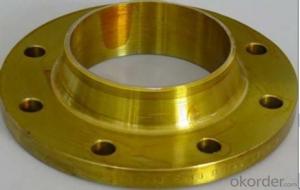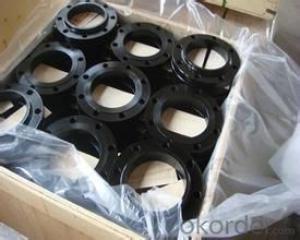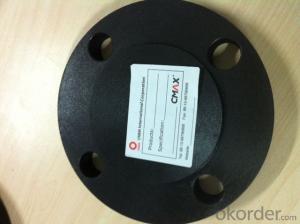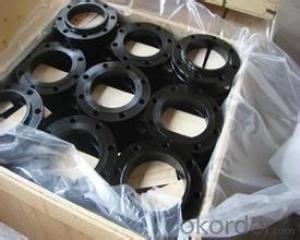CARBON STEEL FORGED BLIND FLANGES A105 ANSI B16.5 best price
- Loading Port:
- Tianjin
- Payment Terms:
- TT OR LC
- Min Order Qty:
- 10 m.t.
- Supply Capability:
- 10000 m.t./month
OKorder Service Pledge
OKorder Financial Service
You Might Also Like
Package Of Carbon Steel Flange:
PACKED IN PLYWOOD CASES OR PALLETS
Painting Of Carbon Steel Flange:
BLACK OR YELLOW PAINTING FOR CARBON STEEL
Marking Of Carbon Steel Flange:
REFER TO MARKING DOCUMENT or AS PER CUSTOMER REQUEST
Shipping Marks Of Carbon Steel Flange:
EACH WOODEN BOX TWO PLASTIC SHIPPING MARKS
Specification Of Carbon Steel Flange:
Carbon Steel Flange Slip On Flange, Plate Flange, Blind Flange, Welding Neck Flange, Socket Welded Flange, Thread Flange, Lap Joint Flange, Long Welding Neck Flange
Size : 1/2"-48"
Wall Thickness.: SCH10-SCH160, SGP , XS, XXS, DIN ,STD
| Name | Carbon Steel Flange |
| Size | 1/2" - 48" |
| Face | RF, FF, RTJ |
| Wall thickness | Sch5-Sch160 XXS,STD,XS, SGP |
| Standard | ASME B16.5, B16.47, BS4504, JIS B2220, API 6A, 11Detc. |
| We can also produce according to drawing and standards provided by customers. | |
| Material | ASTM A105, A350 LF1, LF2, F11, F12, St35.8, St45.8, 15Mo3etc, |
| Packaging | Wooden Cases, wooden pallet , or carton box , or nylog bag and then in wooden cases |
| Surface Treatment | Paintting black or yellow color, or Anti-rust Oil |
| Delivery Time | 20-30 days, after received advance payment. |
| Quality | 100% Heat Treatment, No Welding repair |
| Others | 1.Special design available according to your drawing. |
| 2.anti-corrosion and high-temperature resistant with black painting | |
| 3. All the production process are made under the ISO9001:2000 strictly. | |
| 4. A conformity rate of ex-factory inspection of products. | |
| 5. we have export right , offering FOB , CNF CIF price |
STANDARD & MATERIAL GRADE
STAMDARD Of Carbon Steel Flange
| Standard | Pressure | Size | |
| European Standard | EN 1092-1 | Class PN6 ~ PN100 | DN10 ~ DN4000 |
| American Standard | ASME B16.5 | Class 150 ~ 2500 | 1/2" ~ 24" |
| ASME B16.47A | Class 150 ~ 900 | 26" ~ 60" | |
| ASME B16.47B | Class 75 ~ 900 | 26" ~ 60" | |
| German Standard | DIN 2527,2566,2573, 2576, 2627-2638,2641,2642,2655,2656 | PN6~PN100 | DN10 ~ DN4000 |
| Australian Standard | AS2129 | Table: T/A, T/D, T/E, T/F, T/H, T/J, T/K, T/R, T/S, T/T | DN15 ~ DN3000 |
| AS4087 | PN16 ~ PN35 | DN50 ~ DN1200 | |
| British Standard | BS4504 | PN2.5 ~ PN40 | DN10 ~ DN4000 |
| BS10 | T/A, T/D, T/E, T/F, T/H | 1/2" ~ 48" | |
| Japanese Standard | JIS B2220 | 5K ~ 30K | DN10 ~ DN1500 |
| API Standard | API 6A, 11D | 2000 PSI ~ 20000 PSI | 1 13/16" ~ 30" |
| French Standard | NFE 29203 | PN2.5 ~ PN420 | DN10 ~ DN600 |
MATERIAL Of Carbon Steel Flange
| Carbon Steel | ||
| Material Standard | Material Grade | |
| ASTM | ASTM A105 | A105, A105N |
| ASTM A350 | A350 LF1, LF2 | |
| ASTM A182 | F11, F12, F22 | |
| ASTM A106 | A, B, C | |
| DIN EN | DIN17175 | St35.8, St45.8, 15Mo3 |
| EN10216-2 | 195GH,P235GH, P265GH, 20MnNb6 | |
| JIS | JIS G3461 | STB340,410,510 |
| JIS G3462 | STBA12, 13, 20, 22, 23, 24 | |
| JIS G3454,G3455,G3456 | STPG 370, STB410, STS370,410, 510 | |
| STPT 370, 410, 480 | ||
- Q: What is the role of steel pipes in the construction of bridges and tunnels?
- The construction of bridges and tunnels heavily relies on steel pipes, which are widely used for various purposes due to their strength, durability, and versatility. When it comes to bridge construction, steel pipes are commonly utilized to fabricate the structural framework of the bridge. They act as the primary load-bearing members, providing support and stability to the entire structure. Steel pipes are particularly favored in bridge construction because of their high tensile strength, enabling them to withstand heavy loads, including the weight of vehicles and the dynamic forces generated by traffic. Steel pipes are also essential in the construction of bridge piers and abutments, which serve as the foundation and support for the bridge structure. To create sturdy foundations that can withstand the forces exerted by the bridge's weight and external factors such as wind, water currents, and seismic activity, steel pipes are often driven deep into the ground. Similarly, in tunnel construction, steel pipes play a critical role. They are extensively used for tunnel lining, which involves the installation of structural elements along the tunnel walls and roof to ensure stability and prevent soil or rock collapse. Steel pipes are commonly used as reinforcement elements, ensuring the structural integrity of the tunnel and protecting it from external pressures. Furthermore, steel pipes are utilized for underground utility systems in both bridges and tunnels. They act as conduits for various utilities, including water supply, electrical cables, gas pipelines, and communication lines. Steel pipes are ideal for these applications because of their corrosion resistance, ability to withstand high pressures, and long lifespan. In conclusion, steel pipes are crucial in the construction of bridges and tunnels as they provide strength, stability, and durability to these structures. They play a vital role in ensuring the safety and functionality of these critical infrastructure projects, allowing for efficient transportation and the seamless provision of utilities.
- Q: When can I use the PVC pipe and when to use the galvanized pipe?
- Galvanized pipes are generally used outside the drying environment or building blocks, and PVC is mainly used for pre embedding in walls or humid environments. If in the ceiling ceiling, below the roof, you need to use galvanized pipe, in the floor below, on the ground you need to use PVC.
- Q: Can steel pipes be used for geothermal energy systems?
- Yes, steel pipes can be used for geothermal energy systems. Steel pipes are commonly used in geothermal energy systems due to their strength, durability, and resistance to high temperatures and corrosion. They are able to withstand the harsh underground conditions and are suitable for transporting the geothermal fluid from the heat source to the surface for energy extraction.
- Q: Can steel pipes be used for flagpoles?
- Yes, steel pipes can be used for flagpoles.
- Q: How do steel pipes perform in high-altitude applications?
- Steel pipes perform well in high-altitude applications due to their strength, durability, and resistance to extreme weather conditions. They can withstand the low temperatures and high winds typically found at high altitudes, making them a reliable choice for various industries such as oil and gas, construction, and infrastructure development. Additionally, steel pipes have the ability to maintain their structural integrity under high pressure, making them suitable for transporting fluids and gases at high altitudes.
- Q: What are the different grades of steel pipes?
- There are several different grades of steel pipes, including carbon steel, stainless steel, and alloy steel. Each grade has its own unique properties and is used for specific applications based on factors such as strength, corrosion resistance, and temperature resistance.
- Q: What are the factors affecting the cost of steel pipes?
- There are several factors that can affect the cost of steel pipes. Some of the main factors include the price of raw materials, such as iron ore and coal, which are used in the steel manufacturing process. Additionally, the cost of labor, transportation, and energy can also impact the overall cost of steel pipes. Market demand and competition within the industry can also influence prices. Finally, factors such as government regulations, trade policies, and currency exchange rates can also play a role in determining the cost of steel pipes.
- Q: What is the difference between steel pipes and copper pipes?
- Steel pipes and copper pipes differ in their material composition, durability, cost, and application. Steel pipes are made of an alloy of iron and carbon, providing them with high strength and resistance to corrosion. Copper pipes, on the other hand, are made solely of copper, which offers excellent heat conductivity and resistance to bacterial growth. While steel pipes are more durable and suitable for high-pressure applications, copper pipes are commonly used for plumbing systems due to their malleability, ease of installation, and ability to withstand extreme temperatures. Additionally, copper pipes tend to be more expensive than steel pipes.
- Q: What is the typical lifespan of steel pipes?
- The lifespan of steel pipes can differ based on several factors, including the steel quality, environmental conditions, and pipe maintenance and usage. On average, steel pipes typically last between 50 and 100 years. However, by installing them correctly, conducting regular inspections, and maintaining them appropriately, steel pipes can often surpass this lifespan and offer dependable service for many decades. It is worth noting that corrosion, erosion, and external damage can affect the longevity of steel pipes. Therefore, it is essential to implement preventive measures and carry out necessary repairs to guarantee their durability.
- Q: How are steel pipes used in transportation?
- Steel pipes are commonly used in transportation for various purposes. They are used in the construction of pipelines for transporting fluids, such as oil, gas, and water, over long distances. Steel pipes are also utilized in the manufacturing of vehicle components, including exhaust systems, chassis, and suspension parts. Additionally, steel pipes can be found in infrastructure projects like bridges and tunnels, providing structural support for transportation networks.
Send your message to us
CARBON STEEL FORGED BLIND FLANGES A105 ANSI B16.5 best price
- Loading Port:
- Tianjin
- Payment Terms:
- TT OR LC
- Min Order Qty:
- 10 m.t.
- Supply Capability:
- 10000 m.t./month
OKorder Service Pledge
OKorder Financial Service
Similar products
Hot products
Hot Searches
Related keywords
